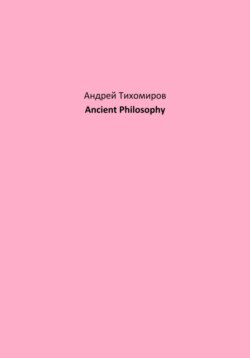Introduction
The culture of the Greeks is the result and condition of freedom. The principle of social and state organization – the polis – the Greek city-state represented the ethical horizon of the citizen. State goals were perceived as personal, the freedom of the state as the guarantor of the citizen's own freedom. That is why philosophy originated not in the metropolis, but in a colony – in Miletus, in the east of Asia Minor, then in southern Italy, and only after that in Greece itself. Because the degree of freedom in the colony was higher. This freedom was supported, in part, by the pathos of independence, which, one might think, fills the life of a colony that is even in the most friendly relations with the mother country. Tradition attributes the introduction of the term "philosophy" to Pythagoras. Structurally, the phenomenon of philosophy represents the unity of content, method, and purpose.
1. Ancient philosophy
The clear rational motivations of the ancient philosophers distinguish them from other ancient thinkers. The appearance of the first philosophical schools in the cities of Asia Minor was not accidental, since it was there that Eastern culture and wisdom had a direct impact on the worldview of the Greek sages. This influence can be found, for example, in scientific and practical knowledge (astronomical, geometric, mathematical), which the Greeks transformed into a general system of numbers and geometric figures.
A distinctive feature of the first schools of ancient philosophy is its cosmocentrism, its focus on understanding the "cosmos", "nature". Even man, with his consciousness and soul, who occupied an important place in the philosophical teachings of ancient thinkers, was considered by them, first of all, as an integral part of nature.
The following stages can be distinguished in the development of ancient philosophy: 1) the formation of ancient Greek philosophy (VI —V centuries BC) – the problems of the cosmos and nature were in the center of attention; 2) classical Greek philosophy – the teachings of Socrates, Plato and Aristotle (V —IV centuries BC) – the main attention is paid to the problems of man, his essence and cognitive capabilities; 3) The Greco-Roman, or Hellenistic, stage (the end of IV BC – IV century. A.D.), associated with the decline of Greek democracy and the relocation of the center of political and spiritual life from the Greek polis (city-states) to the capital of the emerging Roman Empire. The term "antique" (Latin antiquus – ancient) is used to refer to the history, culture, philosophy of Ancient Greece and Ancient Rome.
The philosophy of ancient Greece was formed in conditions when a free citizen of the polis was the main figure of society. Therefore, the Greeks (especially in the early stages), reflecting universal interests, dealt primarily with problems of a cosmic and logical-epistemological nature. At the same time, ethnic issues gradually formed, which began to dominate at a later stage – the Greco-Roman.
Since its inception, philosophy has not only claimed to be the mentor of life, but also aspired to scientific rigor, although it almost never achieved this. As the great German philosopher I. Kant later noted, one can teach to philosophize, but not philosophy, because philosophy has no foundation in the form of an empirical base. She is a castle in the air, living only until the next philosopher. From this point of view, the ancient philosophy is first of all interesting for us, which for the first time formulated the task in this way and tried to translate it into reality.
Ancient philosophy seeks to explain the totality of reality. Her interests are far from the later interests of science, the branches of which explain only individual fragments of reality. In fact, philosophy is created by a question addressed to reality as a whole: what is the beginning of all things? The subject of philosophy is being, reality as a whole. Being, in turn, can be revealed only through understanding the origin of all things.
Method: ancient philosophy strives for a rational explanation, while assuming the universal as the subject. In philosophy, reason, logic, and logos are important. Philosophy should go beyond facts and experience, relying on reason. Rationality at the level of logos is the difference between philosophy and such ideological forms as religion and art.




